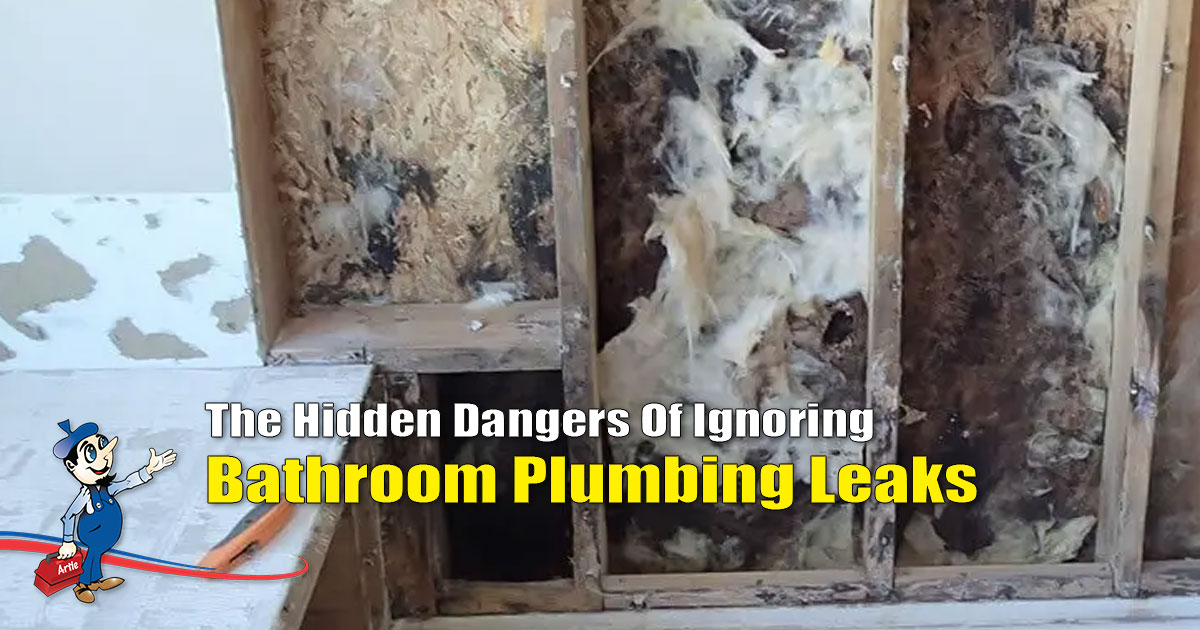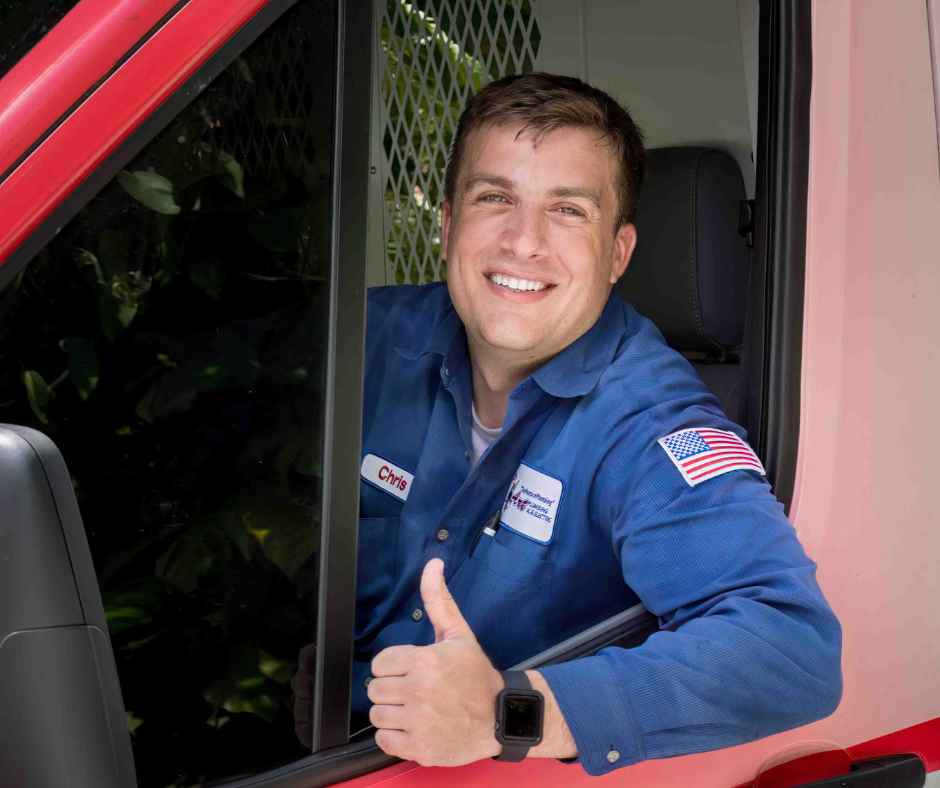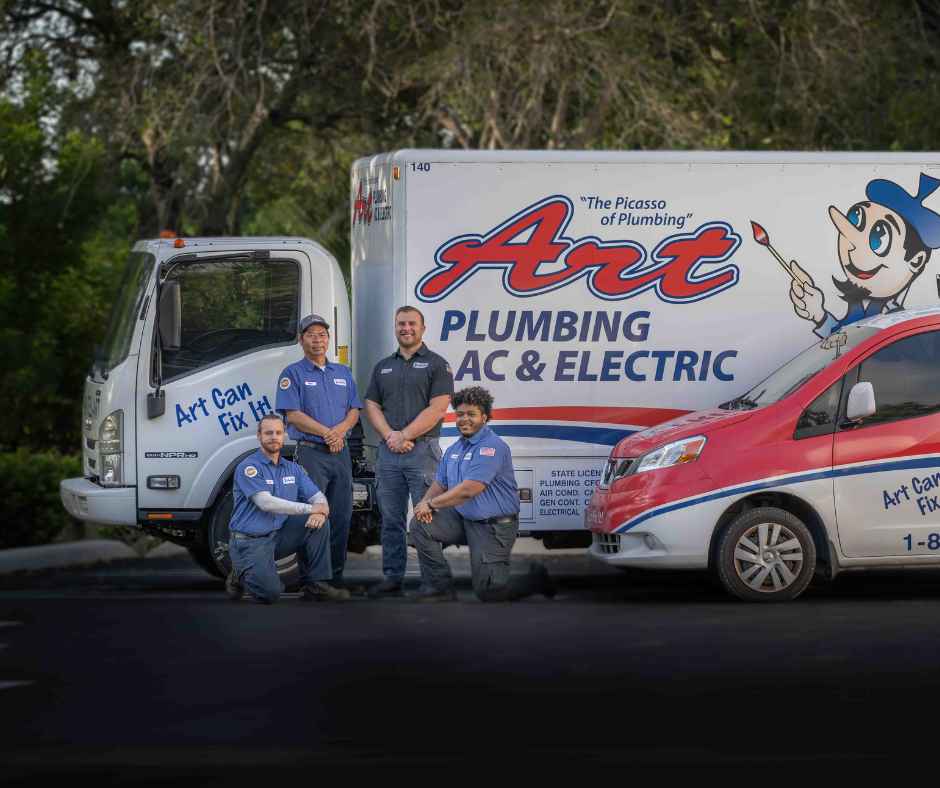The Hidden Dangers Of Ignoring Bathroom Plumbing Leaks

It’s easy to brush off a small drip under the sink or a tiny puddle near the toilet. After all, how much harm could it really cause? The truth is, even the smallest bathroom plumbing leaks can quickly snowball into major problems for your home. Beyond wasting water and driving up your utility bills, leaks can damage your home’s structure, invite pests, promote mold growth, and even put your family’s health at risk.
In South Florida, where humidity is already a challenge, ignoring leaks can make matters worse by creating the perfect breeding ground for mold and bacteria. That’s why staying proactive with your plumbing is just as important as getting your yearly doctor’s check-up: it’s preventive care for your home.
In this blog, we’ll cover the hidden dangers of ignoring bathroom leaks, the costly consequences they bring, and how working with a licensed professional like Art Plumbing, Air Conditioning & Electric can help you detect and fix leaks before they spiral out of control.
What Can Happen If You Ignore Bathroom Plumbing Leaks
Bathroom plumbing leaks may look harmless at first glance, but the damage they cause builds quietly over time. Beyond wasting water, leaks can weaken your home’s structure, encourage mold, attract pests, and lead to expensive water damage. The sooner you address leaks, the less likely you are to face these costly consequences.
1. Structural Damage to Your Home
Even a small drip can have a big impact. Over time, water from bathroom plumbing leaks seeps into walls, floors, and even the foundation of your home. What begins as a minor inconvenience can escalate into rotting wood, warped flooring, and cracked foundations that threaten your home’s stability. In South Florida, where heavy rains and humidity are already tough on buildings, a hidden leak only adds more stress.
Leak detection services from a licensed plumber can identify the source of the problem before it gets out of hand, protecting your home’s structure and saving you from costly repairs.
2. Mold Growth and Health Risks
Moisture is the lifeblood of mold. A bathroom leak, whether it’s a dripping faucet, a slow toilet leak, or a hidden pipe crack, creates the perfect breeding ground for mold spores. Once mold spreads behind walls or under tile, it’s not only difficult to remove but also dangerous for your health.
Common symptoms of mold exposure include:
- Allergies or worsening asthma
- Persistent coughing or congestion
- Skin and eye irritation
In humid climates like South Florida, mold growth accelerates quickly. Fixing bathroom leaks promptly keeps your family safe and reduces the risk of expensive mold remediation later.
3. Leaks Attract Pests and Vermin
Where there’s water, pests are never far behind. Bathroom leaks provide a steady source of hydration for ants, roaches, rodents, and even termites. Left untreated, these pests don’t just create a nuisance; they can contaminate food, spread bacteria, and leave behind toxic droppings that put your household at risk.
By scheduling professional plumbing repairs at the first sign of a leak, you reduce the chance of turning your bathroom into a pest hotspot.
4. Costly Water Damage and Rising Bills
A hidden bathroom leak can quietly drain your wallet in two ways: higher monthly water bills and long-term damage repair costs. Drywall, tile, flooring, and even personal belongings like furniture and electronics can all be destroyed when leaks are ignored.
What seems like a minor drip today can quickly add up to thousands of dollars in damage tomorrow, making prompt repair the smartest investment.
What to Do When You Spot a Bathroom Plumbing Leak
A bathroom leak may seem small, but waiting to “see if it stops” can cost you big. The good news? With the right steps, you can protect your home and wallet from serious damage. Here’s exactly what to do the moment you notice a drip, puddle, or hidden moisture:
1. Shut Off the Water Fast
Don’t let water keep flowing. Turn the shut-off valve under the sink, behind the toilet, or at the main line. The faster you stop the water, the less damage it can cause.
2. Contain the Mess
Grab towels, buckets, or even a wet/dry vacuum if you have one. Containing leaks quickly keeps your floors, cabinets, and belongings safe.
3. Look for the Source (But Don’t DIY Too Much)
Loose connections or worn-out washers may look like an easy fix, but many “simple leaks” hide bigger problems behind the walls. A quick patch often just buys time.
4. Call a Licensed Plumber You Trust
This is the most important step. A licensed plumber has leak detection tools to find the real issue and repair it before it turns into a major disaster. Waiting or hiring the wrong person could leave you with mold, pests, or structural damage.
5. Book Preventive Maintenance
Once the immediate problem is fixed, don’t stop there. Regular plumbing checkups help catch weak spots before they burst, saving you money and stress long-term.
How to Prevent Bathroom Leaks Before They Start
Stopping leaks before they happen is the smartest way to protect your home and avoid costly plumbing emergencies. The good news? A few simple habits can make a big difference:
1. Watch Your Water Bill
If your monthly water bill suddenly spikes without explanation, you may have a hidden leak. Don’t ignore the numbers, as they’re often the first warning sign.
2. Inspect Fixtures Regularly
Check under sinks, around toilets, and behind appliances for any signs of dampness, discoloration, or musty odors. Even small drips can add up to big damage.
3. Replace Worn-Out Parts
Rubber washers, toilet flappers, and supply hoses wear out over time. Swapping these parts every few years can prevent unexpected leaks.
4. Maintain Caulking and Grout
Water seeps into the tiniest gaps. Keep caulking around tubs, showers, and sinks in good condition to stop moisture from reaching walls and floors.
5. Schedule Professional Plumbing Inspections
The best prevention is expert care. A licensed plumber from Art Plumbing, Air Conditioning & Electric can perform routine inspections, identify weak spots, and recommend small fixes before they turn into major headaches.
Call Art Plumbing, Air Conditioning & Electric Today
Don’t let a small bathroom leak turn into a big, expensive problem. At Art Plumbing, Air Conditioning & Electric, our licensed plumbers have decades of experience helping South Florida homeowners protect their homes from leaks, water damage, and costly repairs.
- Licensed and insured plumbing experts
- Advanced leak detection technology
- Preventive maintenance services
- 24/7 emergency plumbing repairs
If you’ve noticed a bathroom leak or just want the peace of mind that comes with a professional inspection, contact us today. Protect your home, your health, and your wallet with the trusted plumbing team Coral Springs and South Florida homeowners have relied on for over 40 years.
Frequently Asked Questions About Bathroom Leaks
How can I tell if a bathroom leak is coming from a pipe behind the wall?
Hidden leaks often leave indirect clues such as peeling paint, bubbling wallpaper, musty odors, or unexplained damp spots on walls or floors. If you suspect a hidden leak, it’s best to call a plumber with leak detection tools to confirm before the damage spreads.
Are bathroom plumbing leaks covered by homeowners insurance?
Most policies cover sudden, accidental leaks (like a burst pipe) but often exclude long-term or neglected leaks that lead to mold and structural damage. That’s why it’s important to report leaks quickly and keep documentation of any repairs.
Can small bathroom leaks increase my water bill significantly?
Yes. Even a slow drip can waste hundreds of gallons of water each month. Over time, that adds up to noticeable spikes on your water bill, making small leaks surprisingly expensive if ignored.
What’s the difference between a plumbing leak and normal condensation?
Condensation usually forms on pipes or fixtures during hot, humid conditions, especially in bathrooms without good ventilation. Unlike leaks, condensation dries up once humidity drops. Persistent dampness, pooling water, or stains typically point to an actual leak that needs repair.
How often should I have my bathroom plumbing inspected for leaks?
A good rule of thumb is to schedule a professional plumbing inspection every 1–2 years, or sooner if your home is older or you notice warning signs like mold, odors, or water stains. Preventive inspections can catch small leaks before they cause serious damage.





